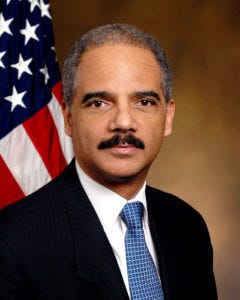Ink by the Barrel: Assessing the Obama Administration's "War on the Press"
There’s an old adage about tangling with the press that advises: “Never pick a fight with someone who buys ink by the barrel.” The Obama administration must be reflecting on the wisdom of that advice these days. The administration's pursuit of leakers of classified information has led to accusations that it is at war with the press.
Over the past few years, the press has concluded that this administration is just about the worst thing that ever happened to them. James Risen, the New York Times reporter under subpoena to testify in the criminal trial of his alleged source Jeffrey Sterling, has said he believes President Obama “hates the press” and that Obama is the “greatest enemy to press freedom in a generation.” Susan Page of USA Today recently claimed that the Obama White House is “more dangerous” to the press than any other White House in history.
The resignation of Attorney General Eric Holder has led to another round of criticism of the administration’s treatment of journalists, as people reflect on Holder’s tenure. In a recent column in the Washington Post ominously titled “Holder’s Dark Legacy,” First Amendment lawyer David Schulz argued that the Obama administration has been “worse than Nixon” for freedom of the press.
So how did a liberal Democrat -- and former constitutional law professor to boot – end up branded as one of the greatest threats to the free press in the nation’s history?
Attorney General Eric H. Holder, Jr.
Leak Prosecutions By the Obama Administration
Much of the criticism stems from the Obama administration's aggressive prosecution of leakers of classified information. A popular talking point is that this administration has prosecuted twice as many leakers as all other administrations in history, put together. This is true, and sounds like a startling statistic, until you realize that the grand total of such prosecutions by the Obama administration is seven – and at least a couple of those cases were actually started during the Bush years.
That's right: out of all the people who now call themselves journalists, all the media reports being filed every day, and all of the leaks constantly taking place, the Obama administration has summoned the vast prosecutorial resources of the federal government to wage "war on the press" by bringing a grand total of about one case a year. And of course those cases aren’t brought against journalists, but against federal employees who have violated their oaths to maintain classified information.
This slight uptick in leak prosecutions from a mere trickle to a slightly larger trickle is not really surprising. Security concerns in general have greatly increased in the post-9/11 world, causing the government to take certain leaks more seriously.
In addition, technology has made leaks potentially much more damaging. In the past, if sensitive information was leaked to a media outlet such as the New York Times, the government could usually depend on the editors contacting them about a potential story and at least listening to any security concerns the government had. Now, however, with the click of a mouse, a leaker can disseminate information worldwide instantly, with no need to go through any journalist, much less a “mainstream media” reporter. Little wonder that the administration is trying to head off such leaks before they even occur.
The Press Response to Leak Prosecutions
Most observers would probably look at this handful of leak prosecutions and conclude the administration is making at least a modest effort to protect national security by deterring disclosures of sensitive classified material. The press, however, looks at these prosecutions and sees an assault on the First Amendment. To them, these cases are not about plugging leaks but about attempting to muzzle journalists.
The press, of course, depends on leaks from confidential sources in order to fulfill their role of acting as a government watchdog and keeping the public informed. But cracking down on leaks is not the equivalent of waging war on the press.
Leakers of classified information are, by definition, breaking the law. Despite the government's efforts, such leaks continue at a robust pace. To some degree this is both inevitable and healthy, particularly given the amount of material the government classifies. The press regularly receives leaks of classified information when they occur. But that doesn't mean there is a First Amendment right to expect that federal employees will routinely violate their oaths -- or that the government will always look the other way when they do.
Most members of the media presumably agree there are some core government secrets that need to be kept. No one would argue, for example, that a government employee should be able freely to leak the identity of covert government agents overseas, or planned military operations during time of war, or similarly vital national security information.
If the press deems leak prosecutions an assault on freedom of the press, the logical implication of that position is that leakers should never be punished. But if leakers could act with impunity, then rules protecting classified information would be toothless and impossible to enforce and national security would be at risk. If a leak is serious enough, then investigation and prosecution have to be an option. The target of such cases is the leak, not journalism itself, and a leak prosecution is not an attack on the press.
Seeking Information from Journalists
A related aspect of this controversy is that investigations of leak cases sometimes require seeking information from journalists. As I’ve noted elsewhere, leak cases are different from most investigations.
If a confidential source leaks information to the press about some criminal misconduct at the Pentagon, for example, a prosecutor who wants to investigate that misconduct has no need to talk to the reporter or discover the reporter’s source. When a source is merely reporting misconduct by others, the government has tremendous power through the grand jury to investigate that misconduct directly.
In a leak case, however, the potential criminal misconduct is the source's disclosure of classified information. The conversation with the reporter is itself the crime being investigated. The source is the target of the investigation and frequently the reporter is the only direct witness. In such cases, in order to prove the crime beyond a reasonable doubt, it may be necessary to seek information from the reporter in the form of e-mail or phone records or even testimony about the source’s identity.
The cases in which this happens are extremely rare. Under Department of Justice guidelines, information may be sought from a reporter only as a last resort, and only after multiple levels of approval. When it happens it’s almost always in a leak case – and even in many of those, the government manages to prove the case without seeking any information from the journalist who received the leak.
In the rare case in which the government does seek information from a journalist, however, the reaction of the press generally borders on the apocalyptic. Any such efforts are seen not as steps to prosecute the leak, but as an attack on journalism itself. For example, despite the Fourth Circuit Court of Appeals ruling that he is a critical government witness in the prosecution of Jeffrey Sterling, James Risen has repeatedly claimed he has been subpoenaed because the government is trying to punish him for his reporting. Risen is currently on a tour promoting his new book, where he regularly talks about his supposed status as a victim of government persecution and how it is evidence that Obama "hates the press."
(As an aside, although Risen apparently believes the government officials who are supposedly “after” him are quite corrupt, he must not think they are very creative. As his case demonstrates, prosecuting a source is a lousy way to punish a journalist. It will be incredibly slow, as the reporter's employer hires top-notch legal talent to spend years in court battling the subpoena. It will also turn the reporter into a martyr and folk hero within the journalism community, resulting in speaking gigs, journalism awards, and great material for a book tour -- as the saying goes, you can't buy that kind of publicity. If the source ends up pleading guilty, as about 95% of criminal defendants do, or if the case otherwise goes away, then the reporter will never be called to testify and will never risk being punished for contempt at all. If this administration really is “worse than Nixon” and is motivated by a desire to punish Risen, you might expect them to sic the IRS on him or use some other more efficient and effective method.)
It’s remarkable to me how the press -- with a few notable exceptions such as the Washington Post's Walter Pincus -- loses all perspective over any government investigation that touches in any way on their activities. There tends to be no recognition of competing interests or the possible need to compromise. It reminds me of the National Rifle Association, which usually responds to even the most modest gun control proposal with overblown claims that the Second Amendment is under assault and the government is coming to take your guns. What the government sees as an attempt to improve public safety, the gun lobby sees as an all-out assault on the right to bear arms.
Similarly, what the government sees as an attempt to stop damaging leaks of classified material, the press sees as proof that the administration is an enemy of the First Amendment. ("Obama is coming to take your newspapers!!"). The press are usually quick to call out other groups that make such overblown claims, but seem unable to apply that same media spotlight to themselves.
The Truth About the "War on the Press"
There’s another saying that in any war, truth is the first casualty. The truth about the alleged “war on the press” is that these leak cases are not about the press at all. They are about investigating crimes involving potentially grave harm to national security, where journalism occasionally gets caught in the crossfire. The government prosecuting about one such case per year poses no threat to the First Amendment or to our robust free press.
For more than two centuries there has been a healthy tension between the right and obligation of the free press to inform the public and the legitimate need of the government to keep secret certain vital information. In general this push and pull – with the government trying to keep some secrets and the press trying to ferret them out – is healthy for our democracy. This tension flares up from time to time in skirmishes such as those involving Risen, but an occasional skirmish is not a war.
Update 12/13/14: According to press reports today, Attorney General Holder has decided that the Department of Justice will not seek to compel Risen to identify his source, despite having fought for three years to enforce the subpoena. If this were indeed a war, you'd have to call that decision an unconditional surrender.



